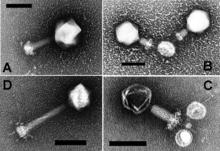User:Coolieosss/sandbox

Marine virology is a new sub-field of Virology and a growing part of Oceanography. Due to the nature of exploration of the ocean, we know very little information about the viruses that inhabit these waters. This is the result of a variety of things, mostly being the lack of need as most commercial fishing has no use for the information because these viruses have not infected humans. As such no real research has been done here until recently.
Classification
[edit]Marine Virology is the study of aquatic ecosystems. This is considered a sub-field of virology and uses all of the same or similar techniques as normal virology does. Being in an aquatic environment, the viruses would have different means of spreading but there are analogues methods out on dry land. Relatively little is known about the field and really very few studies have been done.[1]. What is known is that the ocean is almost entirely microbes and they have a huge impact on all systems of aquatic life.[2] Viruses have a potential of living with all of these organisms and living peacefully besides them or be a part of destroying them and helping fuel dwindling fish supplies.[3] While marine bacteriophages are just starting to be studied, all the other viruses that infect other organisms in the ocean are not very well studied.
Implications
[edit]Because so little is known about them, further research into the field could lead to staggering results. A majority of our oxygen comes from the ocean in the form of phytoplankton and there could be regalia of viruses that affect them and subsequently affect all of the other organisms on the food chain. It is estimated that of all viral infections, the ones in the ocean take place up to 1023 of the infections per second in the entire planet[4], and viruses that affect the producers on the food chain ultimate have the largest affect due to the wide audience that they can infect but some fish might but in danger due to viruses.

History
[edit]The field is currently dominated by only a hand full of individuals. These individuals have been looking closely at how the ocean works and seeing exactly how major of a role viruses are playing. They see that they viruses aren’t just something that occurs on land, but occurs in the ocean, as well as the total impact they have[5]. Viruses are not just a part of the ecosystem, but a major player. They are now know to be wide spread among all living things and the knowledge that they live in the ocean now only drives this further home.
Effect
[edit]The effect of these viruses is still to be determined specifically but they are wide effects that it can have. The first and most obvious are the fact that diseases can be spread from organism to organism and directly affect the species population. But at a more microscopic level, viruses can also help increase genetic diversity by helping to shuffle DNA from microbe to microbe and transfect them. By doing this, viruses are able to affect the individual in a variety of ways making changes over time to most ecological levels up to ecosystem. By changing things and pulling strings behind the scenes in almost everything in the ocean, viruses’ could play a huge part in Evolution and might have impacted everything that took place before land animals even existed.
References
[edit]- ^ Ortega, Ray. "Curtis Suttle-Marine Virology". http://www.microbeworld.org/podcasts/microbeworld-video/1334-curtis-suttle-marine-virology-mwv66. Microbe World. Retrieved 27 July 2014.
{{cite web}}: External link in|website= - ^ Hoyle, Brain; Robinson, Richard. "Microbes in the Ocean". www.waterencyclopedia.com. Water Encyclopedia. Retrieved 28 July 2014.
- ^ Cooke, Robert. "Worldwide Dwindling Fish Supply Brings Cry Of Alarm From Scientists". http://community.seattletimes.nwsource.com/archive/?date=19980206&slug=2732882. The Seattle Times. Retrieved 28 July 2014.
{{cite web}}: External link in|website= - ^ "The Suttle Lab". http://www.ocgy.ubc.ca/~suttle/. The Suttle Laboratory, Marine Virology, and Microbiology. Retrieved 7/27/2014.
{{cite web}}: Check date values in:|accessdate=(help); External link in|website= - ^ "The Suttle Lab". http://www.ocgy.ubc.ca/~suttle/. The Suttle Laboratory, Marine Virology, and Microbiology. Retrieved 7/27/2014.
{{cite web}}: Check date values in:|accessdate=(help); External link in|website=

